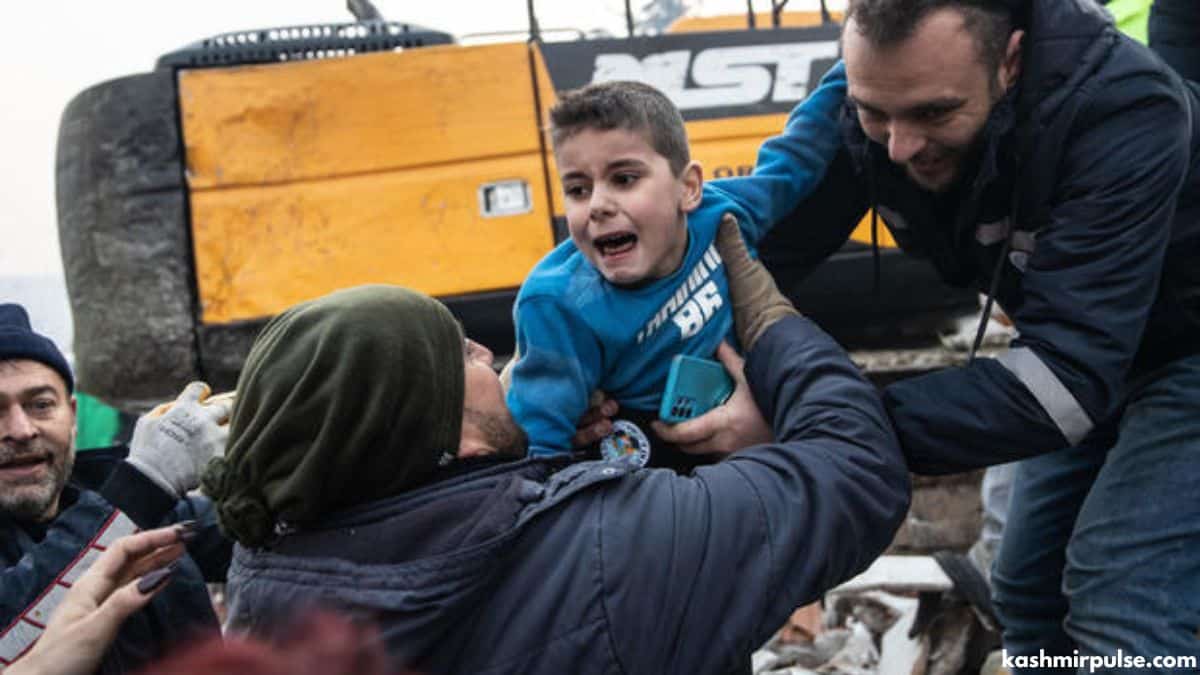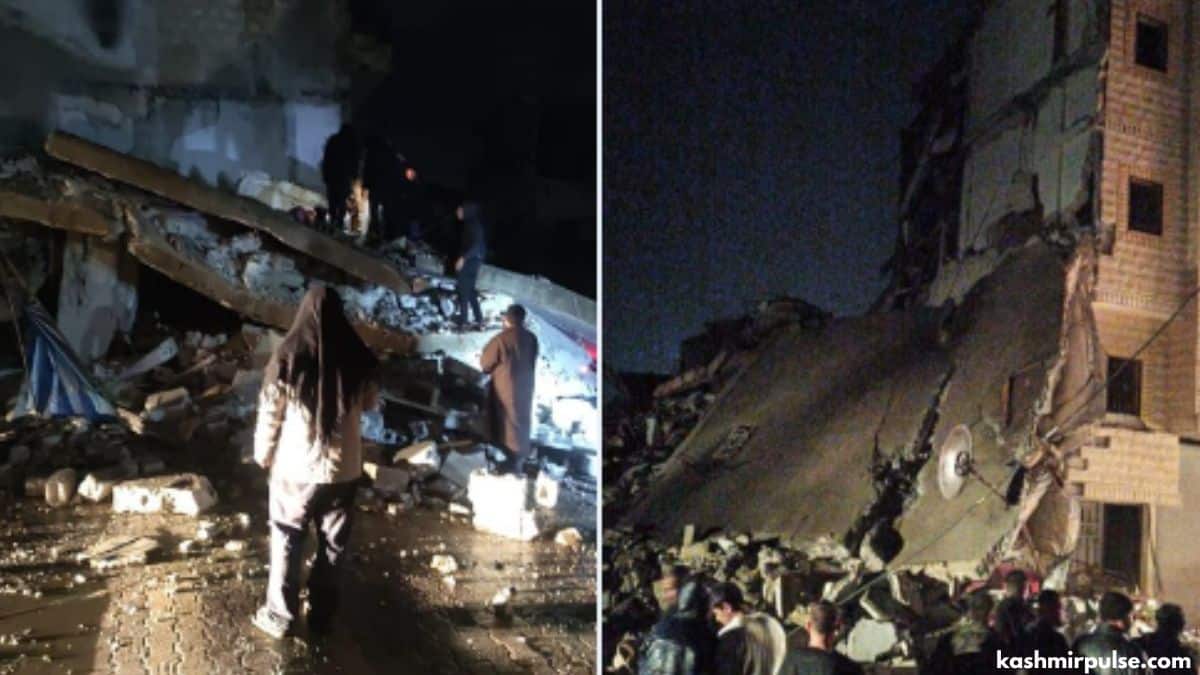
ANKARA (TURKEY) — Thinly-stretched rescue teams on Wednesday continued searching for survivors buried in the rubble of thousands of buildings destroyed in Turkey and Syria by catastrophic earthquakes and aftershocks that killed over 11,000.
Amid calls for the Turkish government to send more help to the disaster zone, Turkish President Recep Tayyip Erdogan visited a "tent city" in Kahramanmaras, where people forced from their homes are living. He conceded shortfalls early in Turkey's disaster response but vowed that no one would "be left in the streets."
Turkey now has tens of thousands of aid personnel in the quake zone, and search teams from more than two dozen countries have joined them. But with the devastation so widespread, many are still waiting for help, and hope of rescuing survivors is fading.
Experts said the survival window for those trapped under the rubble of collapsed buildings or otherwise unable to access water, food, protection from the elements or medical attention was closing rapidly. At the same time, they said it was too soon to abandon hope for more rescues.
"The first 72 hours are considered to be critical as the condition of people trapped and injured can deteriorate quickly and become fatal if they are not rescued and given medical attention in time," Steven Godby, a natural hazards expert at Nottingham Trent University in England, said.
Turkey's disaster management agency said on Wednesday that the recovered bodies of people who died in the earthquakes but cannot be identified would be buried within five days even if they remained unnamed.
The agency, known as AFAD, said unidentified victims would be buried following DNA tests, fingerprinting and after being photographed for future identification. The move is in line with Islamic funeral rites, which require burial to take place as quickly as possible after a person's death.
In the Turkish city of Malatya, bodies were placed side by side on the ground, covered in blankets, while rescuers waited for funeral vehicles to pick them up, according to former journalist Ozel Pikal, who saw eight bodies pulled from the ruins of a building.
Pikal took part in the rescue efforts and said he believes at least some of the victims may have frozen to death as temperatures dipped to 21 degrees Fahrenheit. "Today isn't a pleasant day, because as of today, there is no hope left in Malatya," Pikal told The Associated Press by telephone. "No one is coming out alive from the rubble."
Pikal said a hotel building collapsed in the city and more than 100 people may be trapped.
He said there was a shortage of rescuers in the area he was in, and the cold, road closures and damage in the region have also impeded mobility and access. "Our hands cannot pick up anything because of the cold," said Pikal. "Work machines are needed."
The scale of suffering was also staggering in Syria, a region already beset by more than a decade of civil war that has displaced millions within the country, prompting many to seek refuge in Turkey. With thousands of buildings toppled there, it wasn't clear how many people might still be trapped underneath the rubble.
Aid efforts in Syria have been hampered by the ongoing war and the isolation of the rebel-held region along the border, which is surrounded by Russia-backed government forces. Syria itself is an international pariah and is under Western sanctions linked to the war.
The United Nations said it was "exploring all avenues" to get supplies to the rebel-held northwest of the country, and on Wednesday, the Syrian Observatory of Human Rights said Egypt had sent a medical and rescue team.
The European Union said Wednesday that Syria had asked for humanitarian assistance to support the victims. An EU representative insisted the bloc's sanctions against the Syrian government had no impact on its potential to help.
Syrian Prime Minister Hussein Arnous visited neighborhoods in the northern city of Aleppo on Wednesday, where buildings collapsed. "Our priority now is to rescue the people who are still under the rubble," he said.
In rebel-held parts of northwest Syria, rescuers pulled a man, a woman and four children from the rubble in the towns of Salqeen, Harem and Jinderis, according to the White Helmets group.
On Monday afternoon in the northwestern Syrian town of Jinderis, residents found a crying newborn still connected by the umbilical cord to her deceased mother. The baby was the only member of her family to survive when her family home collapsed, her father's cousin told the AFP news agency. The baby's father, mother, aunt and siblings perished.
Polish rescuers working in Turkey said they had pulled a number of people alive from the rubble so far, including parents with two children and a 13-year-old girl from the ruins in the city of Besni. They said low temperatures were working against them, though two firefighters told Polish TVN24 that the fact that people were caught in bed under warm covers by the pre-dawn quake could help.
But David Alexander, a professor of emergency planning and management at University College London, said data from past earthquakes suggested the likelihood of survival was now slim, particularly for individuals who suffered serious injuries or significant blood loss. "Statistically, today is the day when we're going to stop finding people," he said. "That doesn't mean we should stop searching."
Alexander cautioned that the final death toll may not be known for weeks because of the sheer amount of rubble that needs to be sifted.
Stories of rescues did continue to provide hope, however. Nearly two days after the quakes, rescuers pulled a 3-year-old boy, Arif Kaan, from beneath the rubble of a collapsed apartment building in Kahramanmaras, which isn't far from the epicenter.
With the boy's lower body trapped under slabs of concrete and twisted rebar, emergency crews spread a blanket over his torso to protect him from below-freezing temperatures as they carefully cut the debris away from him, mindful of the possibility of triggering another collapse.
The boy's father, Ertugrul Kisi, who himself had been rescued earlier, sobbed as his son was pulled free and loaded into an ambulance. "For now, the name of hope in Kahramanmaras is Arif Kaan," a Turkish television reporter proclaimed as the dramatic rescue was broadcast to the country.
Many survivors in Turkey have had to sleep in cars, outside or in government shelters.
"We don't have a tent, we don't have a heating stove, we don't have anything. Our children are in bad shape. We are all getting wet under the rain and our kids are out in the cold," Aysan Kurt, 27, told The Associate Press. "We did not die from hunger or the earthquake, but we will die freezing from the cold."
As many as 23 million people could be affected in the quake-hit region, according to Adelheid Marschang, a senior emergencies officer with the World Health Organization, who called it a "crisis on top of multiple crises."
Erdogan, on his tour of quake-hit areas, acknowledged that there were problems early on in the response but said it had improved. He said his government would distribute the equivalent of $532 to affected families.
The disaster comes at a sensitive time for Erdogan, who faces presidential and parliamentary elections in May amid an economic downturn and high inflation. Perceptions that his government mismanaged the crisis could severely hurt his standings.
The region sits on top of major fault lines and is frequently shaken by earthquakes. Some 18,000 were killed in similarly powerful earthquakes that hit northwest Turkey in 1999.
This post first appeared on
The Kashmir Pulse




